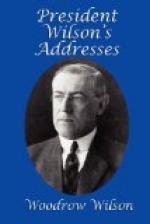I do not mean to say that any American government would throw any obstacle in the way of any terms of peace the governments now at war might agree upon, or seek to upset them when made, whatever they might be. I only take it for granted that mere terms of peace between the belligerents will not satisfy even the belligerents themselves. Mere agreements may not make peace secure. It will be absolutely necessary that a force be created as a guarantor of the permanency of the settlement so much greater than the force of any nation now engaged or any alliance hitherto formed or projected that no nation, no probable combination of nations could face or withstand it. If the peace presently to be made is to endure, it must be a peace made secure by the organized major force of mankind.
The terms of the immediate peace agreed upon will determine whether it is a peace for which such a guarantee can be secured. The question upon which the whole future peace and policy of the world depends is this: Is the present war a struggle for a just and secure peace, or only for a new balance of power? If it be only a struggle for a new balance of power, who will guarantee, who can guarantee, the stable equilibrium of the new arrangement? Only a tranquil Europe can be a stable Europe. There must be, not a balance of power, but a community of power; not organized rivalries, but an organized common peace.
Fortunately we have received very explicit assurances on this point. The statesmen of both of the groups of nations now arrayed against one another have said, in terms that could not be misinterpreted, that it was no part of the purpose they had in mind to crush their antagonists. But the implications of these assurances may not be equally clear to all,—may not be the same on both sides of the water. I think it will be serviceable if I attempt to set forth what we understand them to be.
They imply, first of all, that it must be a peace without victory. It is not pleasant to say this. I beg that I may be permitted to put my own interpretation upon it and that it may be understood that no other interpretation was in my thought. I am seeking only to face realities and to face them without soft concealments. Victory would mean peace forced upon the loser, a victor’s terms imposed upon the vanquished. It would be accepted in humiliation, under duress, at an intolerable sacrifice, and would leave a sting, a resentment, a bitter memory upon which terms of peace would rest, not permanently, but only as upon quicksand. Only a peace between equals can last. Only a peace the very principle of which is equality and a common participation in a common benefit. The right state of mind, the right feeling between nations, is as necessary for a lasting peace as is the just settlement of vexed questions of territory or of racial and national allegiance.




